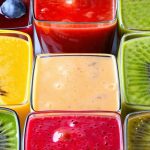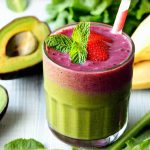The gut microbiome—the vast community of microorganisms residing in our digestive tract—is increasingly recognized as central to overall health. It influences not just digestion, but also immunity, mental well-being, and even chronic disease risk. A thriving gut ecosystem relies on diversity – a wide range of microbial species working together harmoniously. Modern diets, characterized by processed foods, antibiotics, and stress, often disrupt this delicate balance, leading to dysbiosis—an imbalance in the gut flora. Fortunately, dietary interventions, particularly incorporating specific ingredients into daily routines like smoothies, can powerfully support a healthier gut. Smoothies offer a convenient and delicious way to deliver targeted nutrients that nourish beneficial bacteria, promote optimal digestion, and foster microbial variety.
This isn’t simply about adding probiotics (live microorganisms) to your diet, though those have their place. It’s more fundamentally about providing prebiotics—the fuel for the good bacteria already living within us—and creating an environment where they can flourish. This means focusing on fiber-rich foods, fermented components, and polyphenol-packed ingredients. A thoughtfully constructed smoothie can be a potent tool in this ongoing process of cultivating a resilient and balanced gut microbiome. It’s about building long-term health from the inside out, one sip at a time. Consider incorporating practices from daily rituals to further support gut health.
Building Blocks: Prebiotic Powerhouses for Gut Health
Prebiotics are essentially food for your gut bacteria. They are types of fiber that humans can’t digest but microbes readily ferment, producing beneficial compounds like short-chain fatty acids (SCFAs). SCFAs, such as butyrate, propionate, and acetate, have numerous health benefits, including reducing inflammation, strengthening the gut barrier, and supporting immune function. Integrating prebiotic-rich ingredients into your daily smoothie is one of the most effective ways to nourish your microbiome.
- Bananas (especially slightly green ones) are a fantastic source of resistant starch, a type of prebiotic fiber that escapes digestion in the small intestine, reaching the colon where it feeds beneficial bacteria.
- Apples contain pectin, another soluble fiber known for its prebiotic properties and ability to regulate bowel movements. Leaving the peel on maximizes the fiber content.
- Oats (rolled oats are best) provide beta-glucan, a powerful prebiotic fiber that supports gut health and may help lower cholesterol levels.
- Chicory root is an exceptional source of inulin, a potent prebiotic fiber often used as a coffee substitute, but readily incorporated into smoothies for its gut-boosting benefits. A little goes a long way due to its strong flavor.
Beyond these core ingredients, consider adding small amounts of other prebiotic sources like garlic (in very small quantities!), onions, and leeks – though their flavors may not always be desirable in a smoothie! The key is variety; different prebiotics feed different bacterial species, promoting a more diverse gut ecosystem. Remember to gradually increase your fiber intake to avoid digestive discomfort. You might also find simple breakfast options helpful for incorporating prebiotics into your routine.
Fermented Foods & Beyond: Supporting Microbial Diversity
While prebiotics are essential, incorporating ingredients that directly introduce beneficial bacteria – probiotics – can further enhance gut health and diversity. However, probiotic supplementation isn’t always necessary; many foods naturally contain live cultures. Fermented foods, in particular, are excellent sources of probiotics.
- Kefir is a fermented milk drink teeming with diverse strains of probiotics. A small amount (1/4 – 1/2 cup) can be easily added to smoothies. Dairy-free kefir alternatives made from coconut or other plant milks are also available.
- Yogurt (plain, unsweetened) is another probiotic powerhouse, though the strains present vary depending on the brand. Look for yogurts that specify “live and active cultures.”
- Sauerkraut & Kimchi, fermented cabbage dishes, offer a unique flavor profile and a wealth of beneficial bacteria. A tablespoon or two can add a tangy kick to your smoothie.
However, it’s important to remember that probiotic strains are fragile. Heat, stomach acid, and certain medications can kill them off before they reach the gut. Therefore, combining probiotics with prebiotics (a synergistic effect known as synbiotic nutrition) is crucial. The prebiotics provide food for the probiotics, helping them survive and thrive in the digestive tract. Furthermore, don’t underestimate the power of polyphenols – compounds found in fruits, vegetables, and spices – which act as fuel for beneficial bacteria and contribute to overall gut health. Consider natural anti-inflammatory foods to further support your microbiome.
Boosting Digestion with Enzyme-Rich Foods
Digestion is a crucial aspect of gut health. Even with a healthy microbiome, poor digestion can lead to bloating, discomfort, and malabsorption of nutrients. Incorporating enzyme-rich foods into your smoothies can aid the digestive process.
- Pineapple contains bromelain, an enzyme that breaks down protein, easing digestion and reducing inflammation.
- Papaya is rich in papain, another potent proteolytic (protein-digesting) enzyme.
- Mangoes contain amylases, enzymes that help break down carbohydrates.
Adding a small piece of one of these fruits to your smoothie can significantly improve its digestibility. Remember that cooking destroys many enzymatic activity, so fresh fruits are best. Additionally, ginger and mint, both commonly used in smoothies, have digestive benefits – ginger aids gastric emptying and reduces nausea, while mint relaxes intestinal muscles and alleviates bloating. You might also benefit from combining warm liquids with your smoothie to support gut transit.
The Role of Fiber Variety: Beyond Just Quantity
While the amount of fiber is important, the type of fiber is equally crucial for fostering microbial diversity. Different bacteria prefer different types of fiber. A smoothie packed with only one type of fiber won’t provide the same benefits as a smoothie that incorporates a variety of sources.
- Soluble fiber (found in oats, apples, and bananas) dissolves in water to form a gel-like substance, slowing digestion and promoting satiety.
- Insoluble fiber (found in whole grains, nuts, and seeds) adds bulk to stool and helps move waste through the digestive tract.
- Resistant starch (found in slightly green bananas and cooked then cooled potatoes/rice) resists digestion in the small intestine, acting as a prebiotic for gut bacteria.
By including a diverse range of fiber sources – oats, berries, apples, flaxseeds, chia seeds, etc. – you provide food for a wider array of beneficial microbes, leading to a more resilient and balanced gut ecosystem. Experiment with different combinations to find what works best for your digestive system. Planning ahead with meal prep ideas can help you ensure a consistent fiber intake.
Hydration & Gut Health: Don’t Forget the Liquid Base
The liquid base of your smoothie is often overlooked but plays a vital role in both digestion and microbiome health. Water is essential, but other options can offer additional benefits.
- Coconut water provides electrolytes and supports hydration, which is crucial for optimal digestive function.
- Aloe vera juice (in small amounts) has soothing properties that may help calm inflammation in the gut. Be cautious with aloe vera as excessive consumption can have laxative effects.
- Plant-based milks (almond, oat, soy) offer a creamy texture and can be fortified with vitamins and minerals. Choose unsweetened varieties to avoid added sugars.
Avoid sugary juices or heavily sweetened beverages, as these can feed harmful bacteria in the gut and disrupt microbial balance. Focus on hydrating liquids that support overall digestive health and complement the other ingredients in your smoothie. A well-hydrated gut is a happy gut! You could also incorporate thermal recipes into your diet for added warmth and movement.


















